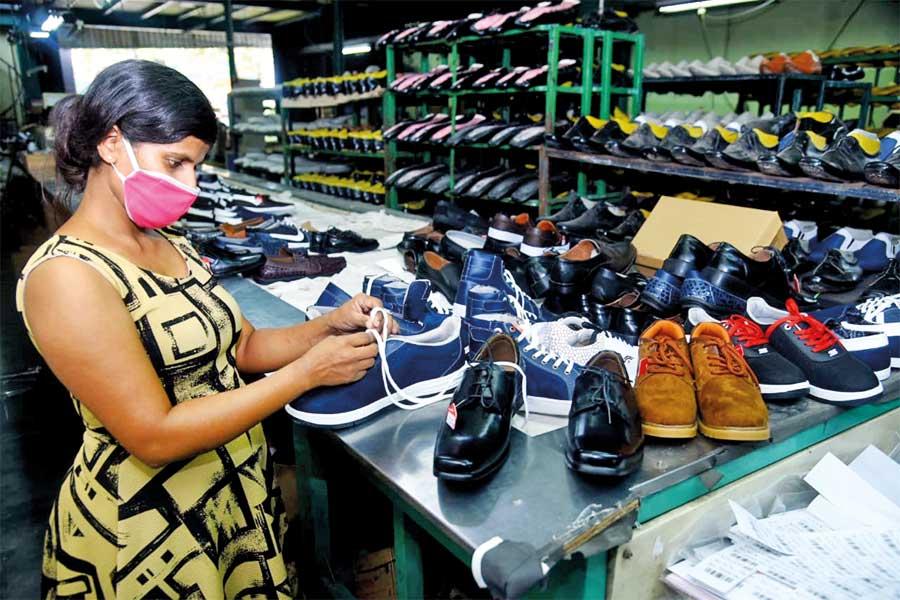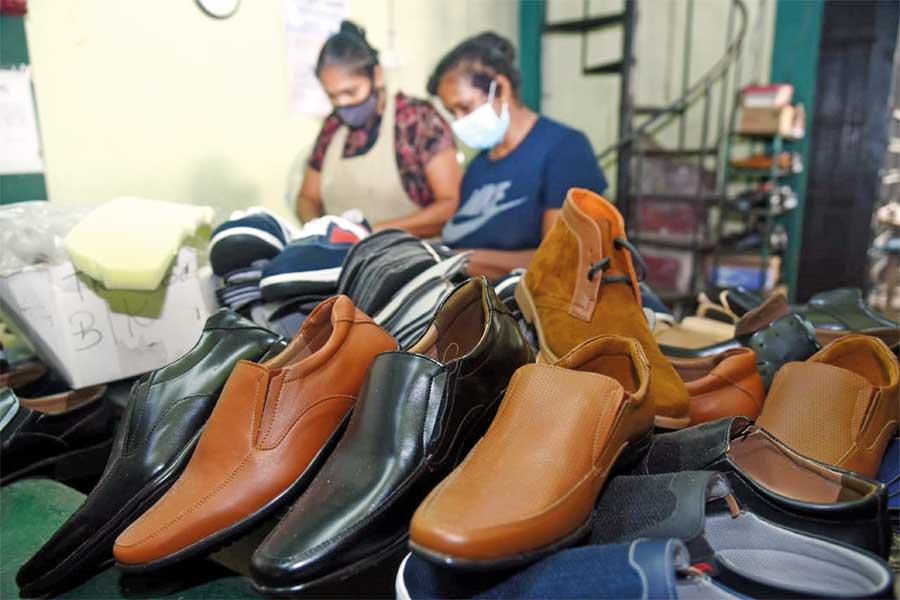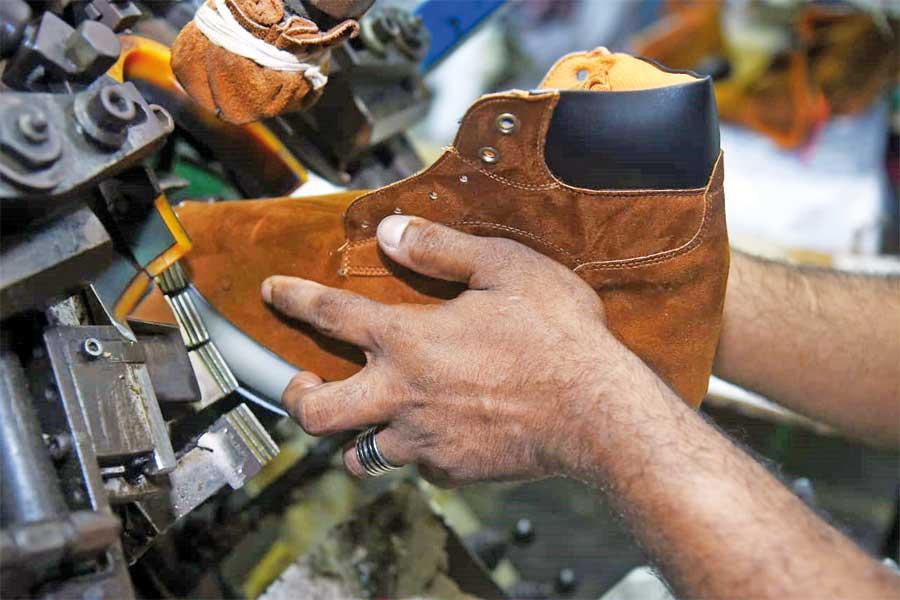Reply To:
Name - Reply Comment

Companies which have obtained tenders are struggling to meet production deadlines due to the crisis
Entrepreneurs of the Small and Medium Scale Enterprise Sector blamed an officer of the Presidential Secretariat for attempting to close down Small and Medium Scale Enterprises (SMEs). The apparel industry is the only source of export revenue in Sri Lanka. Given the economic crisis faced by Sri Lanka if not for these apparel manufacturing factories, established by the former President Ranasinghe Premadasa, the situation would have been worse, these entrepreneurs added. “Even though some people tried to show that the two lockdowns due to the Covid-19 pandemic and the restrictions imposed following the Easter Sunday attacks were the causes for the crisis, they weren’t the truth. This economic downfall resulted due to the dollar crisis in the country.” they added.
for attempting to close down Small and Medium Scale Enterprises (SMEs). The apparel industry is the only source of export revenue in Sri Lanka. Given the economic crisis faced by Sri Lanka if not for these apparel manufacturing factories, established by the former President Ranasinghe Premadasa, the situation would have been worse, these entrepreneurs added. “Even though some people tried to show that the two lockdowns due to the Covid-19 pandemic and the restrictions imposed following the Easter Sunday attacks were the causes for the crisis, they weren’t the truth. This economic downfall resulted due to the dollar crisis in the country.” they added.
 The importation of raw materials required to maintain SME industries has been a challenge due to the shortage of foreign reserves. SME industries are at risk of closing. SME entrepreneurs pointed out that jobs of five million employees are at stake. Footwear and Leather Products Manufacturers Association Vice President Neville Perera said 500,000 employees out of this number are working in companies dealing with footwear and leather products and they would start feeling the ‘heat’ in a month.
The importation of raw materials required to maintain SME industries has been a challenge due to the shortage of foreign reserves. SME industries are at risk of closing. SME entrepreneurs pointed out that jobs of five million employees are at stake. Footwear and Leather Products Manufacturers Association Vice President Neville Perera said 500,000 employees out of this number are working in companies dealing with footwear and leather products and they would start feeling the ‘heat’ in a month.
Raw materials for SMEs are sufficient only for a month. Commercial banks are not giving dollars to import raw materials. In such a backdrop all SMEs in Sri Lanka are at risk of closing down, Perera said. “Enterprises were hard hit for months following the 2019 Easter Sunday attacks and they could be operated thereafter only for three months. With the outbreak of Covid-19 enterprises were down again,” he added.
The Government granted relief to businesses during Covid-19 and the concessionary period comes to an end in December. SME entrepreneurs have to pay off those overdue loan installments and interests after December. “SME entrepreneurs are capable of paying off these loans and are getting orders to earn money. A crisis outweighing Covid-19 has affected them and that is the lack of raw materials for the footwear industry. Leather importers refuse to provide leather because there is an unavailability of chemicals that are used to produce this leather. There are no foreign reserves to import these chemicals. Interested parties have applied through banks to import the chemicals, but that has not become a success due to the lack of dollars. The top part of a shoe cannot be produced without leather. Rexine importers also say they do not have dollars to import rexine. Manufacturers of shoe soles cannot produce them anymore as it is unthinkable to import raw materials. There are no dollars to buy threads to produce shoelaces. Entrepreneurs are facing many issues regarding the subject of importing raw materials due to lack of foreign reserves.
"Raw materials for SMEs are sufficient only for a month"
“There are many other manufacturing entities linked to the footwear industry. Each industry is connected with one another in the production of footwear and produced a network of industries. All these industries have faced mounting changes due to the lack of raw materials. There is a higher demand for local ready-made products due to restrictions on imports and exports as a result of Covid-19. Many items were produced locally during the pandemic and that has marked the turning point in the country’s development,” explained Perera. He pointed out that people have not yet realised this. “Covid-19 is not the reason for the fall of SMEs. Vaccination aimed at controlling Covid-19 has come to an end. The booster dose is being administered. If there is no future lockdown there should be production in the country. But there are no foreign reserves to import raw materials. SME entrepreneurs contribute 52% to the National Gross Domestic Product and 75% to employment of the country. 1.5 million people are employed in the government sector and the rest are employed in large scale factories. The Government should focus on importing raw materials needed for SMEs. But there seems to be no such plans,” Perera added.
SME entrepreneurs are not planning to put the Government in trouble and burdening it for other privileges. If footwear companies close down, their employees will be jobless and the Government will be in trouble. The majority of local employees are employed at SME industries. The festival season is beneficial for producers. But if factories do not receive the required raw materials their employees are at stake. 20 containers imported by factory owners are stuck at the port and if they can be released the demands for the festival season could be met. But that too is only a temporary solution to this issue, according to Perera.
"The top part of a shoe cannot be produced without leather. Rexine importers also say they do not have dollars to import rexine. Manufacturers of shoe soles cannot produce them anymore as it is unthinkable to import raw materials. There are no dollars to buy threads to produce shoelaces."

Over 500,000 employees employed in companies dealing with footwear and leather products are vulnerable to lose their jobs
Recognition for footwear
Previous governments have granted concessions to footwear industry. Steps were taken to protect local producers by increasing the CESS tax on imported ready-made items by 500-1000 rupees. Local producers were highly benefitted by this move. The footwear industry was not popular until 2007 and began to gain recognition after the Sri Lanka Export Development Board, Industrial Development Board, Ministry of Industries held the Footwear and Leather Fair at the BMICH.
"500,000 employees working in companies dealing with footwear and leather products set to lose jobs"
“The footwear industry can be regarded as an industry that can go in line with the textile industry. Previous governments supported the footwear industry. This industry brings export revenue to the country as much as the textile industry. If so, the Government should intervene and find solutions to issues faced by SME entrepreneurs, Neville Perera added. The industry received government assistance following the 2007 Footwear Fair until 2017. The Footwear and Leather Products Manufacturers Association has carried forward what was initiated by government institutions. If the industry does not receive raw materials the progress will slow down and the industry would face a crisis,” Perera added.
An officer attached to the Presidential Secretariat has permitted the importation of footwear using his own discretion instead of supplying raw materials to local companies. SME entrepreneurs pointed that this officer doesn’t intend to uplift local industries, but wants to destroy them. “We inform the authorities about our grievances, but we have not received any solution yet. This officer delays importing raw materials for footwear and other industries, but has released low quality imported shoes and large quantities of unessential goods with his associates to the market. If that money can be used to import raw materials for local industries both the industries and employees would be protected. This officer and his associates are trying to convince the President, PM, Finance Minister and Minister of Industries that granting concessions to local entrepreneurs is of no use and that our products are not up to the standard and it is more profitable to import shoes and other goods instead of producing them. Even though we met this officer and conveyed our suggestions on improving footwear and other industries, he would not forward them to the President or any other responsible party. SMEs are at risk of closing down in the future.
“Local footwear manufacturers import raw materials following a specific standard. If applied now, it will take around two months for the raw material to arrive. Raw materials for footwear cannot be purchased in an illegal manners. But the imported ready-made goods don’t meet the standard. Are the authorities allocating money for these goods not allowing the importation of raw materials for local industries because of commissions they receive for imported goods?,” SME entrepreneurs questioned.
The importation of apples, pomegranates, mobile phones and electronic equipment are allowed and there are foreign reserves for that. Perera said that they had been requesting for raw materials for a period of six months with no positive response. “The Central Bank maintained that solutions would be found in a month. It has been six months and the problem remains. We have got only excuses and no solution.” he added.
"SME entrepreneurs have to pay off those overdue loan installments and interests after December"
At present the footwear manufacturers are down to the last stock of raw materials. Once they are used no one will have raw materials and there will be no more shoes. 500,000 employees will be jobless. Banks will not be able to settle loans and the financial system will collapse. Irosha Karunasena, a committee member of the Footwear and Leather Products Manufacturers Association asked the Government to find solutions soon. S. D. S. Vitharana another committee member said that even though the banks maintain that the exchange rate is 203 rupees per dollar it is not the case. “There is a black market mafia created for dollars and they take between 235-240 rupees for a dollar. The income of banks has dropped and if we cannot pay loan installments and interests the financial system will face a huge crisis,” Vitharana added. Banks and financial companies largely operate on loans and bank overdrafts provided to SME entrepreneurs. If they cannot pay off loans the banking system will be affected, Perera added. “Banks have in their possession the documents related to the 20 containers carrying raw materials at the port and are refusing to grant dollars to obtain them. The Central Bank has placed the exchange rate at 203 rupees per dollar while black markets pay higher and as a result dollars come through these black markets. Those who are selling dollars earn a huge income. This will badly impact small scale entrepreneurs engaged in the footwear industry. Those who earn a daily income manufacturing one or two shoes do not have any raw material.” he added. Those who have obtained tenders to supply shoes to public institutes, corporations and departments have faced many issues. Even though there were concessions during lockdowns they are no longer available now. The companies who obtained tenders cannot provide shoes on the due dates due to the lack of raw materials. “Public institutes have charged these companies 1% of the total tender price for failing to supply footwear on time. Those institutes have even blacklisted our companies accusing them of not working on time and delaying supplies. This also has an effect on footwear producers. Therefore the responsible authorities should intervene immediately and take actions to import raw materials for SMEs.” Perera added.
Crisis outweighing COVID-19
 “SME entrepreneurs are capable of paying off these loans and are getting orders to earn money. A crisis outweighing Covid-19 has affected them and that is the lack of raw materials for the footwear industry. Leather importers refuse to provide leather becuase there is an unavailability of chemicals that are used to produce this leather”-
“SME entrepreneurs are capable of paying off these loans and are getting orders to earn money. A crisis outweighing Covid-19 has affected them and that is the lack of raw materials for the footwear industry. Leather importers refuse to provide leather becuase there is an unavailability of chemicals that are used to produce this leather”-
Neville Perera Vice President Leather Products Manufacturers Association
Black market mafia for dollars
 “There is a black market mafia created for dollars and they take between 235-240 rupees for a dollar. The income of banks has dropped and if we cannot pay loan installments and interests the financial system will face a huge crisis”-
“There is a black market mafia created for dollars and they take between 235-240 rupees for a dollar. The income of banks has dropped and if we cannot pay loan installments and interests the financial system will face a huge crisis”-
S.d. S. Vitharana Committee member Footwear and Leather Products Manufacturers Association
“Do not panic. We will not let industries collapse”- Maj. Gen. Ratnayake
 Maj. Gen. Daya Ratnayake Secretary to the Ministry of Industries said discussions were held with the Finance Ministry regarding the importation of raw materials required for footwear and other local industries. “Priority is given to industries that have run out of raw materials. We will not let local industries fall. If that happens we will all fall. The problem is that the country does not have money. That has affected all industries and are not limited to one or two. The Finance Ministry and the Central Bank will discuss with the Presidential Secretariat to solve matters immediately. It’s normal for entrepreneurs to panic when they run out of raw materials. We will not allow industries to collapse. I do not know about the influence of the Presidential Secretariat officer regarding importing of raw materials. I cannot say anything regarding that. If footwear are imported they must be available in the market and I have not heard of that. Do not panic unnecessarily. We will not let industries collapse,” he added.
Maj. Gen. Daya Ratnayake Secretary to the Ministry of Industries said discussions were held with the Finance Ministry regarding the importation of raw materials required for footwear and other local industries. “Priority is given to industries that have run out of raw materials. We will not let local industries fall. If that happens we will all fall. The problem is that the country does not have money. That has affected all industries and are not limited to one or two. The Finance Ministry and the Central Bank will discuss with the Presidential Secretariat to solve matters immediately. It’s normal for entrepreneurs to panic when they run out of raw materials. We will not allow industries to collapse. I do not know about the influence of the Presidential Secretariat officer regarding importing of raw materials. I cannot say anything regarding that. If footwear are imported they must be available in the market and I have not heard of that. Do not panic unnecessarily. We will not let industries collapse,” he added.
Pix by Samantha Perera
Attempts made to contact the Central Bank of Sri Lanka on 0112477000 and 0112477966 and Minister of Industry Wimal Weerawansa provided futile. A spokesperson for the ministry asked to keep contacting the minister as he was occupied. And when inquired from the ministry spokesperson whether the minister has offered a solution to the issues faced by SME entrepreneurs he said that the Minister had had discussions with the Central Bank to import raw materials after solving the dollar crisis, hence a solution would be given soon.
